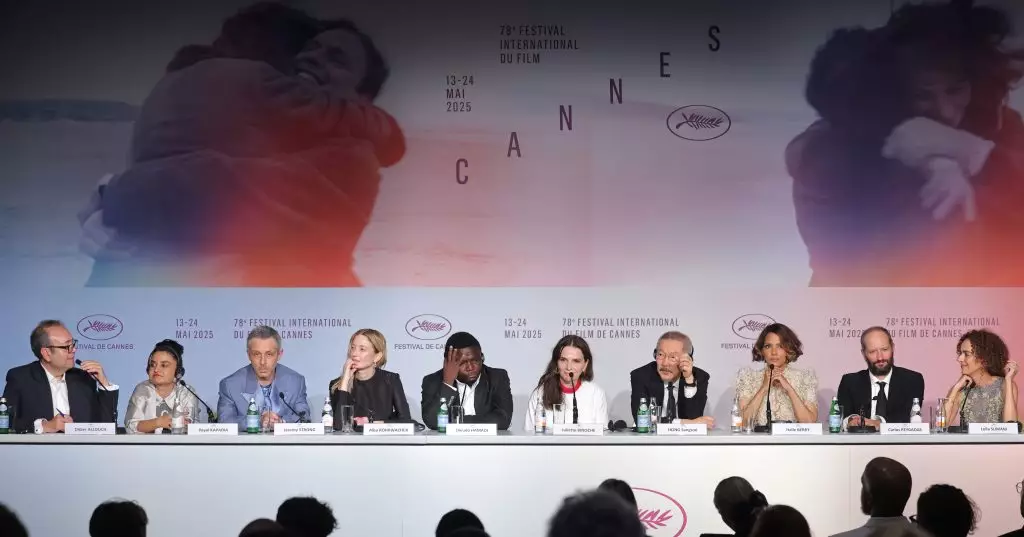In the world of cinema, few accolades hold as much weight as the Cannes Film Festival’s Palme d’Or. This year, a remarkable and unexpected decision propelled Iranian filmmaker Jafar Panahi into the limelight with his poignant film, *It Was Just an Accident*. This stirring piece not only clinched the illustrious award but also resonated deeply with audiences, thanks largely to its thematic underpinnings of resistance and resilience. Jury President Juliette Binoche characteristically emphasized the film’s duality—its potent exploration of human emotion intertwined with pressing political commentary. In an era where artistic expression often faces oppression, Panahi’s film stands as a testament to the enduring power of narrative as a tool for change.
Jafar Panahi: A Voice from the Shadows
Panahi’s journey to this moment has not been a straightforward one. A filmmaker with an extensive history of innovative storytelling, he has faced significant personal and professional trials, including unjust imprisonment for his outspoken criticisms against the Iranian regime. Having already garnered accolades such as the Jury Prize for *Crimson Gold* and the Camera d’Or for *The White Balloon*, Panahi’s accolades reflect a deep, resonant understanding of the human condition and its complexities. Released from prison in 2023, Panahi’s experience of incarceration adds an invaluable depth to his work. As Binoche noted, celebrating his resilience through *It Was Just an Accident* was something the jury felt particularly compelled to do. It’s a moving gesture, highlighting a shared acknowledgment of the struggles artists face globally, especially those in repressive environments.
The Film’s Impactful Narrative
*It Was Just an Accident* tells the story of working-class individuals, tragically wronged by the system and yearning for justice. Rather than succumbing to the savagery of revenge, the characters choose a path of empowerment and healing, challenging the cyclical nature of violence. This narrative choice reinforces Panahi’s belief in the transformative potential of art. As Binoche articulated during the festival, the film invites audiences to reconsider the very notions of justice and humanity. By depicting characters who aspire to listen rather than retaliate, Panahi reframes violence as a societal issue that can be addressed through empathy and dialogue.
The importance of this message cannot be overstated—especially during a time when the world feels increasingly dictated by vengeful impulses and aggression. Panahi’s work compels audiences and critics to confront uncomfortable truths, urging a pivotal shift in cultural discourse. Through this nuanced representation of struggle, the film serves not just as entertainment, but as a powerful catalyst for social change.
The Jury’s Deliberation: More Than Formality
During the press conference, Binoche and fellow jury members expressed the emotional weight and intellectual rigor behind their deliberation process over the festival’s duration. Their discussions transcended mere film critique; they mirrored a collective desire to acknowledge artistry that pushes boundaries and ignites conversations surrounding essential societal issues. Actor Brendan Strong, while providing insight into the jury’s decision-making, underscored that films capable of sparking transcendent conversations about the human experience were more than deserving of recognition. His remark regarding the “softness” art can bring to a harsh world encapsulates a profound understanding of cinema’s role as a transformative art form.
As the jury reflected on their decisions—bestowing the Palme d’Or on Panahi and the Jury Prize to *Sentimental Value*—it was clear that they sought to illuminate works that captured the essence of humanity. This philosophy resonates with their belief that art, particularly in turbulent times, can transcend culture and geography, creating a shared understanding of our vulnerabilities and potential for compassion.
The Road Ahead for Cinema and Society
The themes echoed through the jury’s sentiments, paired with Panahi’s narrative, spotlight a vital truth: art is essential in fostering dialogue and encouraging a reevaluation of our societal values. As audiences engage with films like *It Was Just an Accident*, they embark on a journey that confronts the darker aspects of human existence while illuminating the pathways toward healing and understanding. The festival’s choice to honor Panahi not only celebrates his personal narrative but also serves to inspire a generation of filmmakers and viewers alike to advocate for a world where art and empathy unite to forge a brighter future.
In an age characterized by conflict and division, the role of cinema as a space for resistance and hope cannot be overlooked. Jafar Panahi’s achievement at Cannes is not merely a win for one filmmaker; it’s a resounding affirmation of the power of storytelling as a mechanism for change.

